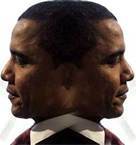 |
| "You've got to be persistent." |
The only thing that will keep him calm for any decent block of time is The Best of Elmo 2. At this point, I have memorized every word on that video.
It consists mostly of famous musicians appearing to sing a song with Elmo, but stuck in there is a brief clip of David Beckham talking about the importance of persistence. It is a simple lesson, but one that I hope sinks in for my son. And it also made me think that maybe I've been a bit too pessimistic about our country recently, including in posts like this. But the best argument in favor of optimism for our future is that American society celebrates and rewards persistence.
Persistence, if you're not willing to watch David Beckham's explanation of it, is simply the willingness to keep trying to solve a problem that doesn't seem solvable after the previous attempt. It is a comfort with starting fresh, with reinvention. And America has been a magnet for persistent people, who are willing to dig as deep as they have to for an answer. And not just our Edisons, our Fords, our Wright Brothers: most everyone who got off a boat to make a new life here was jettisoning old assumptions and comforts to try something new, and was ready to keep trying until they found success. We still have an abundance of these folks, and I feel sure that if things got rough enough, we'd see more of a concerted effort by them to get involved and devise some new solutions.
I think a second element is required to solve big, complex problems: resilience. Some people, I think, might believe the two concepts are similar, but resilience is in many ways a precursor to persistence. The word actually comes from the Latin resili which means to spring back or rebound. Resilient things and people thus have the ability to return to their original state when they become deformed: exactly the opposite of getting bent out of shape. So you need resilience individually to return to your optimistic starting point and try again, but more importantly you need to live in a resilient society, one that doesn't get too distorted by bad laws or bad leaders. The US has, in the Constitution and the system of government built by it, an extraordinarily resilient political system. It has allowed a wildly diverse people over a huge expanse of territory to adapt to changing times and emergent challenges. Though we can't take for granted that it can solve every problem, it would be unwise to bet against it in any particular moment of crisis. As Glenn Reynolds wrote recently, if the federal government becomes overbearing or dysfunctional, we can evolve towards more localized decision-making that can ratchet down some of the national-level disagreements that today seem so resistant to resolution.
Nassim Taleb has been writing about something like this when he talks about antifragility. Basically, he's saying we need to design our institutions so that crisis and even failure makes them stronger, instead of destroying them. He also outlines five ways to build antifragile organizations that should be read by anyone high up in government or business. (I do think the transparent attempt to make 'antifragile' a business buzzword is a little sad, though I'll probably be using it in a presentation at some point next year.) Regardless, one point he made really stuck with me:
Some businesses and political systems respond to stress better than others. The airline industry is set up in such a way as to make travel safer after every plane crash. A tragedy leads to the thorough examination and elimination of the cause of the problem. The same thing happens in the restaurant industry, where the quality of your next meal depends on the failure rate in the business—what kills some makes others stronger. Without the high failure rate in the restaurant business, you would be eating Soviet-style cafeteria food for your next meal out.As a country we've been pretty good about learning from our mistakes: having 50 states means the folks in 49 of them can watch one try something new, and copy the ideas that make things better. A lot of the fear people have about recent trends is that we seem to be making the same mistakes over and over again. Consider how many fiscal crises we've had in the last five years, and how similarly all of them have played out. If we lose our resilience/antifragility, we're in deep trouble.
I grew up in Monroe, Connecticut, one town over from Newtown. A lot of my family lives in that tragedy-stained town, and I think it offers cause for both hope and alarm if we consider what it tells us about our persistence and resilience. On the one hand, we've had a steady stream of these tragedies in recent years, and we haven't been resilient enough to find a new approach to our laws or our culture that would help, and we haven't been persistent enough to stay focused on the issue after it fades from the newspaper headlines. Yet, when you see how the people of that town are handling the horror they've been through, you can't help but believe we still have a reserve of these qualities. They are helping each other, finding creative ways of getting the surviving children back to class, and raising money for the victims' families.
May we apply their example to the equally challenging, but far less awful, issues that face our government and our economy.











